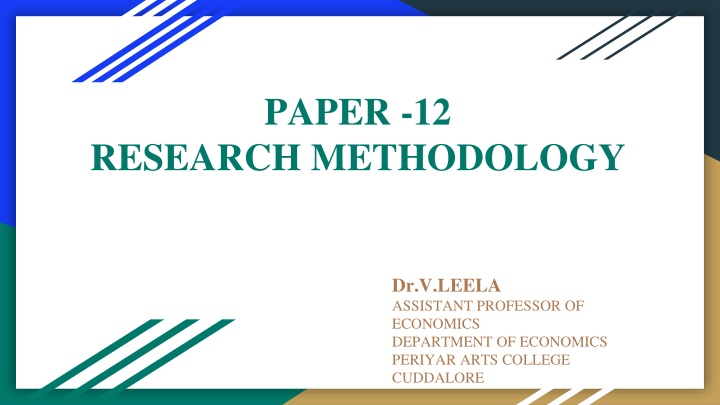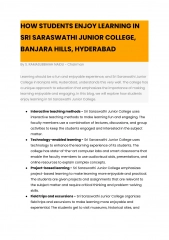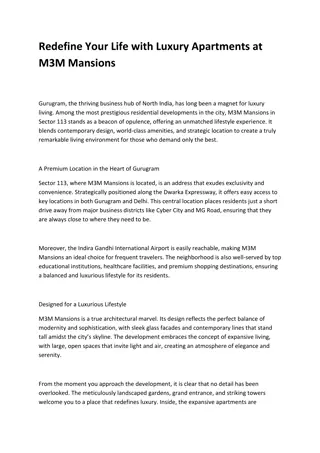
Social Research Methodology: Understanding Types and Definitions
Delve into the world of social research through this comprehensive guide covering the meaning, scope, and types of research, along with defining research methods by notable scholars. Explore the systematic effort to gain knowledge and solve problems in the realm of social sciences.
Download Presentation

Please find below an Image/Link to download the presentation.
The content on the website is provided AS IS for your information and personal use only. It may not be sold, licensed, or shared on other websites without obtaining consent from the author. If you encounter any issues during the download, it is possible that the publisher has removed the file from their server.
You are allowed to download the files provided on this website for personal or commercial use, subject to the condition that they are used lawfully. All files are the property of their respective owners.
The content on the website is provided AS IS for your information and personal use only. It may not be sold, licensed, or shared on other websites without obtaining consent from the author.
E N D
Presentation Transcript
PAPER -12 RESEARCH METHODOLOGY Dr.V.LEELA ASSISTANT PROFESSOR OF ECONOMICS DEPARTMENT OF ECONOMICS PERIYAR ARTS COLLEGE CUDDALORE
UNIT -I : Meaning and Scope of Social Research 1.1 Meaning - Objectives, Characteristics and uses of social research Meaning and Definition Research Definition of Research Social research Objectives of social research Characteristics of social research Uses of social research
1.2 Types of Research,Formulation of a Research Problem Types of Social Research Basic Research Applied Research Functions of Social Research Scope of Social Research Formulation of a Research problem Deductive Approach Inductive Approach
Definition of Research: a) According to Black and Champion, scientific research consist of obtaining information through empirical observation that can be used for systematic development of logically related propositions attempting to establish casual relations among variable . b) Emory defines research as any organized inquiry designed and carried out to provide information for solving a problem . c) Kerlinger defines research as a systematic, controlled, empirical and critical investigation of hypothetical relations among natural phenomena . d) L.V. Redman and A.V.H. Morry have defined systematic effort to gain new knowledge we call research .
Meaning and Definition Research: Research is systematic and organized effort to investigate a specific problem that needs a solution. It contributes to the general body of knowledge. It also corrects human knowledge. Actually research is simply the process of arriving as dependable solution to a problem through the planned and systematic collection, analysis and interpretation of a data. Research is the most important process for advancing knowledge for promoting progress and to enable man to relate more effectively to his environment to accomplish his purpose and to solve his conflicts. Although it is not the only way, it is one of the most effective ways of solving problems. The term research consist of two words, Re + Search . Re means again and again and Search means to find out something.
Social research: Social sciences are not exact science like physical sciences. It deals with human beings. Human nature and man's environment are so complex, that it is more difficult to comprehend and predict human behavior than the physical phenomena. Social science research is a systematic method of exploring, analyzing and conceptualizing human life in order to extend, correct or verify knowledge of human behavior and social life. Social research seeks to find explanations to unexplained phenomena, to clarify the doubtful and correct the misconceived fact of social life. It involves the application of scientific method for understanding and analyzing of social life in order to correct and verify the existing knowledge as a system. The main idea behind social research is to discover new inter relations, new knowledge, new facts and also to verify old ones. Human behavior may be involved by certain values and laws.
The main purpose of social research is to discover those laws which can be proper guidelines for studying human contact and behavior.It is difficult see the underlying uniformities in the diversity of complex human behavior. Social research can be defined as the systematic and objective analysis and recording of controlled observations that may lead to the development of generalization, principles or theories resulting in prediction and possibly ultimate control of events in society. It attempts to answer or solve social problems. According to C. A. Moser : Social research is a systematized investigation to gain new knowledge about social phenomenon and problems. According to P.V. Young: Social research is a scientific undertaking which by means of logical methods, aim to discover new facts or old facts and to analyze their sequences, interrelationships, casual explanations and natural laws which govern them.
Characteristics of social research It is directed towards the solution of problems. The ultimate goal is to discover cause-and-effect relationship between social problems. It emphasis the development of generalizations, principles or theories that will be helpful in predicting future occurrences. It is based upon observable experience or empirical evidence. It demands accurate observations and description. Researchers may choose from a variety or non qualitative description of their observations. It involves gathering new data from primary sources or using existence data for new purpose. Although social research activities may at time be somewhat random and unsystematic, it is more often characterized by carefully designed procedure that applies rigorous analysis.
It requires expertise. The researcher knows what is already known about the problem and how others have investigated. It strives to the objective and logical applying every possible test to validate the procedure employed, data collected and conclusion reached. It involves the guests for answer to unsolved problems. It is characterized by patient and unhurried activity. Researcher must expect disappointment and discouragement as they pursue the answer to difficult question. It is carefully recorded and reported. Each important term is defined, limiting factors are recognized, procedures are described in detail, reference are carefully documented, results are objectively recorded and conclusions are presented with scholarly caution and restraint. It is interdisciplinary in nature It sometimes requires courage.
Uses of social research In a general way, some of the direct practical benefits and theoretic implications of social research may be listed as follows: Social research has a crucial role to play in guiding social planning. Adequate social planning depends for its success on a systematic knowledge above the social resources and liabilities, of the people and their culture; of their similarities and differences, of organizations and operative controls, of their needs, hopes, aspirations and problems. Since knowledge is a particular kind of power, social research, by affording first hand knowledge about the organization and working of society and its institutions, gives us a greater power of control over the social phenomena and action. Thus, social research may be visualized as having practical implications for formal and informal types of leadership, patterns on influence and reform in different spheres of society.
It is a very apt saying that knowledge is enlightenment. It dispels the thrust of outworn assumptions, superstitions and stereotypes. Social research thus, may be expected at-least to afford a more solid basis for people to hold whatever opinions they do. It is obvious that social research has direct implications for social welfare. By virtue of the deeper understanding of the casual nexus underlying various social maladies , social research provides a secure basis for effective remedial measure. A researcher is charged with the responsibilities of asserting some order among facts. Thus research affords a considerably sound basis for prediction. Despite the admittedly low predictive potential of social research, reasonably reliable predictions, perhaps culture-bound or context-bound , can be made.
Every scientist is obliged to effect constant improvements in the tools and techniques of his trade, i.e., research. The social researcher, in so far as he has to work in reference to different spatial-temporal contexts, each challenging his attack, is constantly faced with the need to improve upon his tools or if need be, to fashion new tools to match his skills with the task prompted by the exigencies of the situation.
Objectives of social research To facilitate the understanding of human behavior. To acquire knowledge about social phenomena, events, issue, problems etc. To identify functional relationship existing in the social phenomena. To find out the natural laws that regulates or directs social phenomena. To standardize the society concept, e.g. culture, struggle,generation gap, social distance etc. To formulate solution to social problems. To maintain social organization, remove social tension, misconception, etc. To develop social revival plan.
1.2 Types of Research,Formulation of a Research Problem Types of Social Research 1.Basic research 2.Applied research
Basic research: 1. It is also called fundamental research. 2. It is undertaken to improve our understanding of certain problems that commonly occur in social setting and how to solve them. 3. It undertaken for sole purpose of adding to our knowledge that is fundamental and generalizable. 4. This type of research may have no immediate or planned application.
Applied research: 1. It is also called action or decisional research. 2. It is undertaken in response to a social problem, which requires a solution. 3. Its major purpose is to answer practical and useful question. 4. The results are practically applied to solve immediate problems. 5. It involves normative prescription. 6. As applied research is concerned with knowledge that has immediate application. 7. It is also called decisional research.
Functions of Social Research The important functions of social science research are discussed below; a) Discovery of facts and their interpretation. Social research provides answer to questions of what, when, how and why of man,social life and institutions. Discover of facts and their inter relationship help us to discard distortions and contribute to our understanding of social reality. b) Diagnosis of problems and their analysis. Our society has innumerable problems such as poverty, unemployment, economic inequality, social tension etc,. The nature and dimensions of such problems have to be diagnosed and analyzed. An analysis of problems leads to an identification of appropriate remedial actions. c) Systematization of knowledge. The facts discovered through research are systematized and the body of knowledge is developed. It contributes to the growth of theory building. .
d) Control over social phenomena. Research in social science provides first hand information about the nature of social institutions. This knowledge helps us to control over the social phenomena. e) Prediction. Social research aims at finding an order among social fact and their casual relations This affords a sound basis for prediction in several cases. f) Development planning. Systematic research can give us the required data base for planning and designing developmental schemes and programmes. g) Social welfare. Social research can identify the causes of social evils and problems. It can thus help in taking appropriate remedial actions. It also provides guideline for social welfare.
Scope of Social Research The fields of social science research unlimited and the materials of research are endless. Every group of social phenomena, every phase of human life and every stages of past and present development are materials for the social scientist. The area of research in various social sciences provides vast scope for research in social sciences. The main scope of social research are : 1. Social research provides new insights in to the organized society and its social structure. 2. Social research also provide new horizon in scientific explanation; advanced and tested principles of procedure and suggested new concepts. 3. Another scope of social research is that exemplified by studies and attempt to test or challenge existing theories and revise them the light of new evidence. 4. Social research helpful to establish new theory and established techniques of exploration. 5. It also provides contributions to existing stone of fruitful ideas, methodology and basis understanding of social life and control of its problems.
Formulation of a Research problem RESEARCH PROBLEM FORMULATION OF A PROBLEM WHY IS A GOOD PROBLEM FORMULATION IMPORTANT? RESEARCH METHODS 1.Deductive Approach 2.Inductive Approach
RESEARCH PROBLEM- MEANING A research problem is a question that a researcher wants to answer, or a problem that a researcher wants to solve. A research problem is the situation that causes the researcher to feel apprehensive, confused and ill at ease. Identification & Formulation of research problem is a first step in the research process. It is believed that most of the good research studies needs lot of time for selection of a research problem. RESEARCH PROBLEM- DEFINITION Kerlinger defines, A problem is an interrogative sentence or statement that asks what relation exists between two or more variables .
FORMULATION OF A PROBLEM Formulation means translating and transforming the selected research problem/topic into a scientifically researchable question. It is the demarcation of a problem area within a certain context involving the: WHO WHAT WHERE WHEN and the WHY of the problem situation A problem well defined is a problem half solved ill defined problem may create hurdles like: What data are to be collected? What characteristics of data are relevant and need to be studied? What relations are to be explored. What techniques are to be used for the purpose?
WHY IS A PROBLEM FORMULATION IMPORTANT? Formulation is the first and most important step of a research process. The problem formulation is like an identification of a destination before undertaking a journey. The research problem serves as a foundation of a research study; like a building and its foundation. If it is well formulated, you can expect a good study to follow.
Deductive Research Approach Waterfall THEORY HYPOTHESIS OBSERVATION CONFIRMATION Deductive reasoning works from the more general to the more specific. Sometimes this is informally called a "top-down" approach. Conclusion follows logically from premises (available facts)
Inductive Research Approach Hill Climbing THEORY TENTATIVE HYPOTHESIS PATTERN OBSERVATION Inductive reasoning works the other way, moving from specific observations to broader generalizations and theories. Informally, we sometimes call this a "bottom up" approach Conclusion is likely based on premises. Involves a degree of uncertainty
Deductive Vs. Inductive Induction is usually described as moving from the specific to the general, while deduction begins with the general and ends with the specific. Arguments based on laws, rules and accepted principles are generally used for Deductive Reasoning. Observations tend to be used for Inductive Arguments.




















